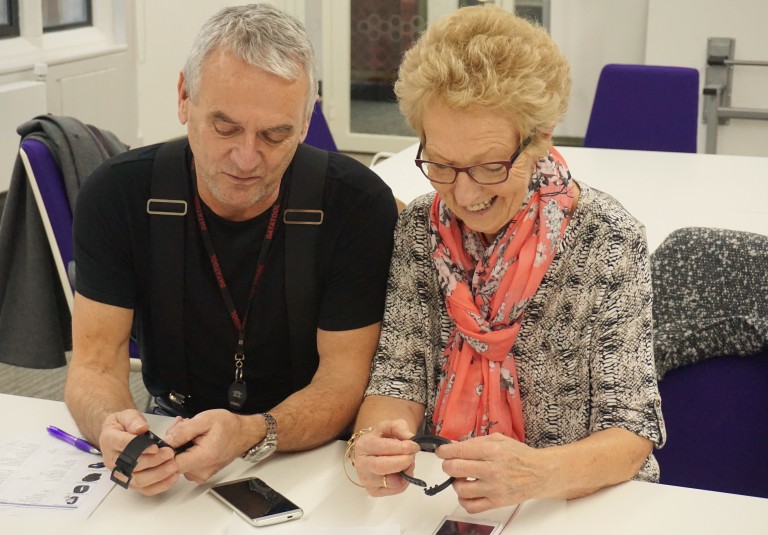Dementias Platform UK (DPUK) Workshops

Dementias Platform UK (DPUK) Public ‘Wearables’ Workshops on Connected Health Research
Lamiece hassan, john ainsworth, angela parker, caroline swarbrick, and caroline sanders
What is Dementias Platform UK?
The Medical Research Council recently established the Dementias Platform UK (DPUK), a multi-million pound investment to drive forward dementia research, collecting and collating information to create unique data sets and a quarry of new evidence. As part of DPUK, The University of Manchester was tasked with creating a ‘sensing platform’ to accelerate dementia research using connected health devices, such as smartphones and wearable activity trackers. This involved procuring a pool of suitable devices and developing software designed to securely receive and store any data generated. To ensure devices were both suitable for data gathering purposes and acceptable to future research participants, we sought feedback from patients and the public.

Workshop participants test wearable devices
"The best thing about the workshop was gaining insight into future dementia research."
Workshop participant
The Workshops
Following a session with researchers to determine technical specifications and data gathering requirements, we purchased a range of devices for testing; Axivity AX3, FitBit Charge HR, MOTO 360, Garmin vívofit 2, Misfit Speedo Shine, Withings Activité Pop, and Withings Pulse Ox.
A series of patient and public workshops were held to explore the acceptability of this type of research and inform device procurement decisions. Over 30 people participated in workshops from October 2015 to January 2016, including people living with dementia and/or mild cognitive impairments, their careers and older people (>50 years) without known memory problems.
Designed to give people a hands on experience with the technology, workshops introduced a range of devices together with possible research scenarios. Volunteer ‘testers’ were able to take a device home to trial in their everyday lives. Follow up sessions were held to discuss experiences and, in light of these, develop recommendations for purchasing devices and conducting research.
"DPUK is a huge opportunity to truly drive forward the pace of progress in dementia research."
Prof. John Gallacher, Director of DPUK
Key findings:
- In principle, patients and the public supported plans for connected health dementia research and were willing to wear devices, provided: 1) they understood the aims, methods and purpose of the study, 2) they gave their consent, and 3) data was stored securely and confidentially.
- Individuals varied in terms of which devices they preferred and the support they needed for set-up. The more popular devices were waterproof, low-maintenance, unobtrusive and gave personalised feedback.
- People wanted feedback on research progress and outcomes. They thought this would make participants feel valued and encourage ongoing participation. They expected researchers to intervene if there were clear signs of treatable health problems requiring attention.
Recommendations:
- The sensing platform should be open to storing data from a variety of devices, available now and in the future.
- A range of devices should be purchased in varying sizes, colours and materials. Devices should be waterproof, have a long-life battery and, ideally, pass for a watch.
- Any devices and software used as part of dementia research, whether existing or new, should provide the necessary security to protect personal data and ensure privacy.
- When recruiting participants to future studies, one-to-one support should be available to help set-up devices and troubleshoot problems. Smartphones and /or tablets should be available for those without their own devices.
- Information provided to prospective participants should include information on confidentiality, data transfer, benefits to individuals and what would happen if researchers were to pick up any irregularities.
Conclusions
We found strong support for research using connected health devices among the patients, carers and members of the public. This avenue of research could help in the fight against dementia by improving prediction techniques, alerting people to early-signs of symptoms and improving treatment and self-management.
It was feasible to integrate requirements from patients and the public in the development of a sensing platform for dementia research. By seeking feedback from a variety of users, we were able to choose devices that are more likely to be wearable and acceptable to users, as well as suitable for research purposes. Furthermore, we identified aspects of research setup and design that could support sustained engagement from participants, thereby improving data completeness and quality.
The sensing platform DPUK is now open to use by researchers; please contact matthew.machin@manchester.ac.uk for more information.
Acknowledgements: We would like to thank everyone who participated in our workshops and meetings. This work was funded by a Medical Research Council award (MR/K006665/1) to the Health eResearch Centre (HeRC) at The University of Manchester.
